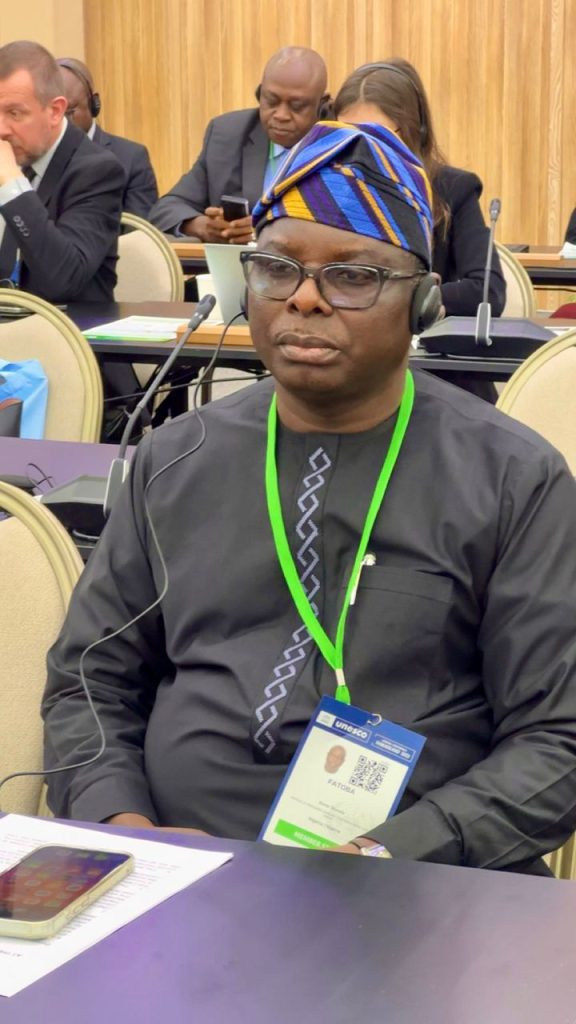Listen to the article
In a significant global gathering addressing today’s most pressing information challenges, the 14th UNESCO Youth Forum has spotlighted media literacy, climate communication, and anti-misinformation efforts, with particular emphasis on youth involvement in creating more informed and inclusive societies worldwide.
The Nigerian delegation joined representatives from across the globe, including youth leaders, media professionals, and UNESCO officials, to examine how media and education can be leveraged as catalysts for positive social change and transformation.
During the proceedings, Nigeria’s Ambassador to UNESCO, Hajo Sani, offered congratulations to the newly appointed UNESCO President while reinforcing Nigeria’s dedication to strengthening its partnership with the organization. Ambassador Sani specifically highlighted Nigeria’s commitment to tackling the growing problem of fake news and promoting responsible communication practices in an increasingly complex media landscape.
The forum gained additional significance through contributions from UNESCO’s Assistant Director-General for Communication and Information, Tawfik Jelassi, who emphasized the organization’s ongoing support for emerging journalists. Jelassi outlined UNESCO’s dedication to promoting ethical reporting standards, with particular focus on climate change coverage and defending freedom of expression globally.
“We must ensure that our information ecosystem promotes inclusivity and ethical standards,” Jelassi noted during his address. He further elaborated on the critical importance of inclusive, multilingual dialogue and the responsible application of Artificial Intelligence technologies, stressing that “no culture, language, or community should be marginalized” as the global information landscape continues to evolve at a rapid pace.
This emphasis on inclusive communication comes at a crucial time when digital divides still prevent billions worldwide from fully participating in the information society. UNESCO’s approach recognizes that addressing information inequality requires multilateral cooperation and targeted investments in digital infrastructure and education.
UNESCO’s Communication and Information (CI) Sector representatives also took the opportunity to reaffirm the organization’s core commitments to safeguarding press freedom, advancing gender equality in media representation and leadership, and empowering youth as responsible digital citizens capable of navigating today’s complex information environment.
The timing of this forum is particularly relevant given the escalating challenges of misinformation worldwide. Recent studies indicate that false information spreads up to six times faster than factual content on social media platforms, creating urgent demands for media literacy skills across all demographics but especially among young people.
Climate communication, another focal point of the forum, has become increasingly crucial as public understanding significantly influences policy support and individual action. UNESCO’s emphasis on ethical reporting in this domain acknowledges that accurate, accessible climate information is essential for informed public discourse and effective climate action.
The Nigerian delegation’s participation highlights the country’s growing role in global discussions about information integrity. As Africa’s most populous nation with over 200 million citizens and a rapidly expanding digital economy, Nigeria faces significant challenges with misinformation while simultaneously developing innovative approaches to digital literacy and responsible communication.
The forum concluded with participants rallying around a shared vision for the future: a world where informed citizens, responsible media practices, and digital inclusion form the foundation of a global information ecosystem. This vision places particular emphasis on the transformative power of education and meaningful youth engagement in shaping communication policies and practices.
As information challenges grow increasingly complex across borders, forums like this provide critical opportunities for international collaboration and knowledge sharing. The emphasis on youth participation reflects recognition that the next generation will ultimately inherit and need to manage these evolving information challenges, making their early involvement in developing solutions both practical and necessary.
Fact Checker
Verify the accuracy of this article using The Disinformation Commission analysis and real-time sources.




11 Comments
The forum’s focus on youth involvement in creating more informed and inclusive societies is a wise approach. Investing in the next generation’s media literacy skills can yield lasting benefits for communities worldwide.
Nigeria’s commitment to partnering with UNESCO on tackling fake news is commendable. Building media literacy skills, especially among youth, is essential for creating more resilient and inclusive societies.
Absolutely. Equipping young people with the ability to critically evaluate information sources and identify misinformation is a wise investment in the future.
The forum’s focus on leveraging media and education to drive positive social change is an encouraging sign. Nurturing youth leadership in this space can yield significant dividends for communities worldwide.
Kudos to the forum for highlighting the importance of climate communication and anti-misinformation efforts. Integrating these priorities with media literacy initiatives can have far-reaching impacts.
Promoting media literacy is a critical step in combating the spread of misinformation. This UNESCO youth forum is an important initiative to empower young people and foster more informed and responsible communication practices globally.
The Nigerian delegation’s participation and emphasis on responsible communication practices is a commendable contribution. Collaborative efforts between nations and organizations are crucial in tackling global information challenges.
It’s encouraging to see UNESCO’s commitment to supporting initiatives that empower young people and foster more informed and inclusive societies. Media literacy is a crucial tool in this endeavor.
Tackling fake news and promoting responsible communication practices is a global challenge that requires concerted efforts. This UNESCO youth forum is a valuable platform for driving meaningful change.
This UNESCO youth forum represents an important step in empowering young people to navigate the complex media landscape and become agents of positive change. Media literacy is a critical skill for the digital age.
It’s heartening to see UNESCO’s continued support for initiatives that combat the growing threat of fake news. Strengthening media literacy skills is a vital component of building more resilient and informed societies.